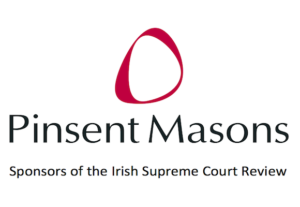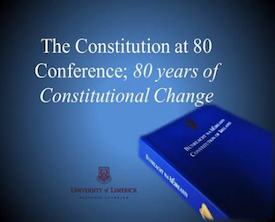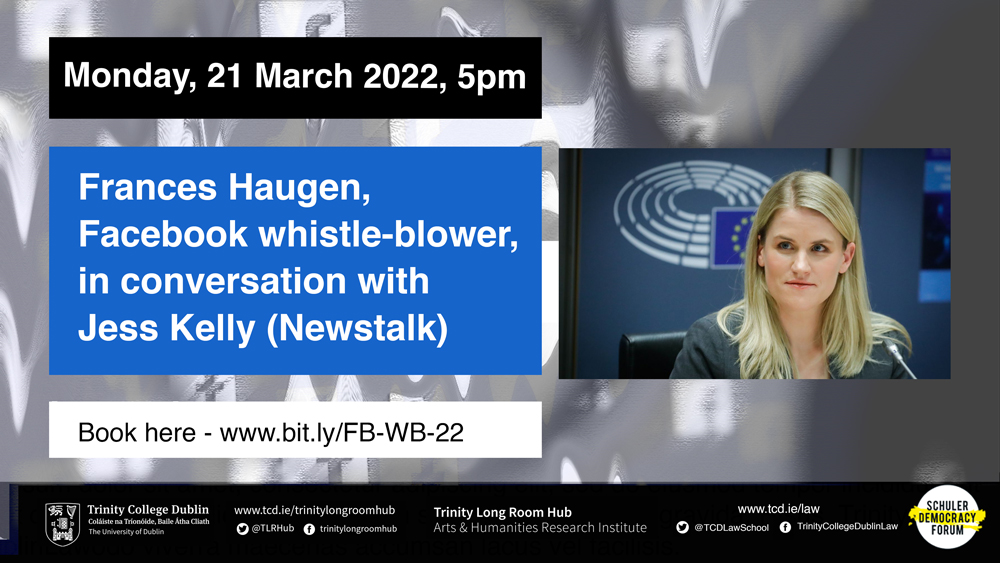 The Irish Supreme Court Review (ISCR), hosted by the School of Law, Trinity College Dublin, and sponsored by Pinsent Masons, is a forum for in-depth analysis of the functions and jurisprudence of the Supreme Court of Ireland.
The Irish Supreme Court Review (ISCR), hosted by the School of Law, Trinity College Dublin, and sponsored by Pinsent Masons, is a forum for in-depth analysis of the functions and jurisprudence of the Supreme Court of Ireland.
The second annual ISCR conference will be held on Saturday 12 October 2018 in Trinity College Dublin.
All are welcome to attend; the fee (inclusive of materials, tea & coffee breaks, and light lunch) is €35.00, or €15:00 (concession for students, pensioners and the unwaged); and registration is essential (via here or here).
SCHEDULE
09:00 Registration: Edmund Burke Lecture Theatre, Room 1008, Arts Building, Trinity College Dublin (map)
09:30 Keynote: Chair: Mark Bell (Regius Professor of Law, and Head of the School of Law, Trinity College Dublin)
Imelda Maher (Sutherland Professor of European Law, and Dean of Law, University College Dublin) “The Supreme Court’s Treatment of EU Law”
10:30 Tea & coffee
11:00 Panel 1: Chair: Mary Finlay Geoghegan (Judge of the Supreme Court, 2017 to 2019)
Noel McGrath (University College Dublin) ACC Loan Management v Rickard [2019] IESC 29 (09 May 2019)
Fiona de Londras (University of Birmingham) P v Minister for Justice and Equality [2019] IESC 47 (31 May 2019)
Des Ryan (Trinity College Dublin) Nano Nagle School v Daly [2019] IESC 63 (31 July 2019)
Áine Ryall (University College Cork) Data Centres, Masterplans and Environmental Assessment Obligations: Fitzpatrick v An Bord Pleanála [2018] IESC 60 (05 December 2018) and [2019] IESC 23 (11 April 2019)
12:30 Light Lunch
13:30 Panel 2: Chair: Iseult O’Malley (Judge of the Supreme Court)
Liz Heffernan (Trinity College Dublin) Statutory Presumptions Affecting the Burden of Proof: Director of Public Prosecutions v Forsey [2018] IESC 55 (08 November 2018)
Mark Coen (University College Dublin Sweeney v Ireland [2019] IESC 39 (28 May 2019)
David Prendergast (Trinity College Dublin) Director of Public Prosecutions v Brown [2018] IESC 67 (21 December 2018)
14:45 Tea & coffee
15:00 Panel 3: Chair: to be confirmed
Fergus Ryan (Maynooth University) P v Judges of the Circuit Court [2019] IESC 26 (30 April 2019)
Brian Murray SC (Law Library, Dublin) Kerins v McGuinness [2019] IESC 11 (27 February 2019), O’Brien v Clerk of Dáil Éireann [2019] IESC 12 (05 March 2019), and Kerins v McGuinness [2019] IESC 42 (29 May 2019)
 On Monday, 28 January 2019, 16.00-17.30, in Regent House (map), Trinity College Dublin, Jules Polonetsky (CEO, Future of Privacy Forum; pictured left) will give a public lecture on
On Monday, 28 January 2019, 16.00-17.30, in Regent House (map), Trinity College Dublin, Jules Polonetsky (CEO, Future of Privacy Forum; pictured left) will give a public lecture on
Navigating Privacy in a Data Centric World
Almost every area of technical progress today is reliant on ever broader access to personal information. Companies, academic researchers, governments and philanthropists utilise ever more sensitive data about individuals movements, health, online browsing, home activity, social interactions. To collect the data, cars, drones, phones, wearables, TVs and faces are tracked. Sensors that see and hear collect new types of information and machine learning provides exponentially deeper analysis. Will European data protection reshape the leading data intensive technologies? With the backlash against tech company practices lead to regulation in the US and globally? What role for Ireland at the centre of the new generation of regulation and tech development? Can data be mined for the benefit of society without creating an Orwellian future?
Jules Polonetsky is CEO of the Future of Privacy Forum (PFP). It is a nonprofit organisation that serves as a catalyst for privacy leadership and scholarship, advancing principled data practices in support of emerging technologies. FPF brings together industry, academics, civil society and other thought leaders to explore the challenges posed by technological innovation and develops privacy protections, ethical norms and workable business practices.…

The Honourable Russell Brown, Justice of the Supreme Court of Canada, will deliver a keynote lecture on the topic of
Indeterminacy in the Duty of Care Analysis
at 6:30pm on Thursday 22 November 2018 in Trinity College Dublin, to launch the Palles Society for Private Law. The lecture will be held in the TRiSS Seminar Room (on the 6th floor of the Arts Block in Trinity (map and directions)); and a reception will follow. The event will be chaired by His Excellency Kevin Vickers, Ambassador of Canada to Ireland. All are welcome to attend, but registration is required.
Christopher Palles (pictured above left) was an unrivalled master of the common law. He was Lord Chief Baron of the Exchequer in Ireland from 1874 until 1916. Professor VTH Delany described him as “the greatest of the Irish judges”.
Justice Russell Brown (pictured above right) has been a puisne justice of the Supreme Court of Canada since 2015. He was a Professor of Law at the University of Alberta before his appointment to the bench. He is the author of Pure Economic Loss in Canadian Negligence Law (LexisNexis Canada, 2011), as well as articles, chapters and essays on tort law, property law and civil justice.…
 Australia and Ireland were the first two countries in the world to introduce legislation to require standardized packing of tobacco products. As Olivia Kelly reports in the Irish Times that the Minister of State for Health Promotion, Catherine Byrne TD launched a landmark Report on the State of Tobacco Control in Ireland to mark World No Tobacco Day yesterday, I’m delighted to announce that a seminar on this topic will be held from 2:00pm to 4:00pm on Tuesday 12 June 2018 in the Neill Lecture Theatre in the Trinity Long Room Hub Arts & Humanities Research Institute, Trinity College Dublin.
Australia and Ireland were the first two countries in the world to introduce legislation to require standardized packing of tobacco products. As Olivia Kelly reports in the Irish Times that the Minister of State for Health Promotion, Catherine Byrne TD launched a landmark Report on the State of Tobacco Control in Ireland to mark World No Tobacco Day yesterday, I’m delighted to announce that a seminar on this topic will be held from 2:00pm to 4:00pm on Tuesday 12 June 2018 in the Neill Lecture Theatre in the Trinity Long Room Hub Arts & Humanities Research Institute, Trinity College Dublin.
The main speaker will be Prof Matthew Rimmer (QUT); I will respond to his presentation; the seminar will be chaired by Prof Shane Allwright (TCD); and there will be plenty of time for questions and answers.
 Matthew Rimmer (pictured right) is Professor of Intellectual Property and Innovation in the Faculty of Law, Queensland University of Technology, Brisbane, Australia. He has recently edited a special issue of the QUT Law Review on the plain packaging of tobacco products worldwide. At the seminar, he will talk about the Australian plain packaging legislation, and the failed challenges to it in the Australian courts, on foot of an investment treaty between Australia and Hong Kong, and before the World Trade Organisation.…
Matthew Rimmer (pictured right) is Professor of Intellectual Property and Innovation in the Faculty of Law, Queensland University of Technology, Brisbane, Australia. He has recently edited a special issue of the QUT Law Review on the plain packaging of tobacco products worldwide. At the seminar, he will talk about the Australian plain packaging legislation, and the failed challenges to it in the Australian courts, on foot of an investment treaty between Australia and Hong Kong, and before the World Trade Organisation.…
 A conference to mark 80 years of Bunreacht na hÉireann, the Irish Constitution, will be hosted by the School of Law, University of Limerick on 11 November 2017 in the Irish World Academy of Music and Dance. The conference will bring together judges, scholars, practitioners, and those with experience of constitutional governance to reflect upon and discuss the past, present and future of Ireland’s constitutional order at this important milestone. Keynote presentations will be delivered by Emily Logan, Chief Commissioner of the Irish Human Rights and Equality Commission, and Mr Justice Donal O’Donnell, Judge of the Irish Supreme Court. I will be delivering a paper in the following panel:
A conference to mark 80 years of Bunreacht na hÉireann, the Irish Constitution, will be hosted by the School of Law, University of Limerick on 11 November 2017 in the Irish World Academy of Music and Dance. The conference will bring together judges, scholars, practitioners, and those with experience of constitutional governance to reflect upon and discuss the past, present and future of Ireland’s constitutional order at this important milestone. Keynote presentations will be delivered by Emily Logan, Chief Commissioner of the Irish Human Rights and Equality Commission, and Mr Justice Donal O’Donnell, Judge of the Irish Supreme Court. I will be delivering a paper in the following panel:
PROPERTY, SOCIAL ECONOMIC RIGHTS AND INJUSTICIABILITY
Dr Eoin O’Dell: Property Rights, Proportionate Restrictions, and Media Pluralism
Dr Claire M Smyth: Social and Economic Rights, Irish Constitution and International Obligations
James Rooney: The Injusticiable Constitution and the Common Good: The Preamble and Directive Principles in Contrast
This is the abstract of my paper:
A Report on the Concentration of Media Ownership in Ireland (2016) raised “grave concerns about the high concentration of media ownership in the Irish market”, and the Irish report for the EU’s Media Pluralism Monitor recommended that legislative limits on levels of media concentration should be applied retrospectively.
…
 The Private Law Discussion Group in the School of Law, Trinity College Dublin, is delighted to welcome Dr Niamh Connolly (University College London) next Thursday, 30 March 2017, at 2:00pm, in the Trinity Research in Social Sciences (TRiSS) Seminar Room, 6th floor, Arts Building, TCD (map), to give a paper on
The Private Law Discussion Group in the School of Law, Trinity College Dublin, is delighted to welcome Dr Niamh Connolly (University College London) next Thursday, 30 March 2017, at 2:00pm, in the Trinity Research in Social Sciences (TRiSS) Seminar Room, 6th floor, Arts Building, TCD (map), to give a paper on
The Future of Restitution in Ireland.
All are welcome, particularly those with a research interest in private law, unjust enrichment and restitution. This event is open to the public and free of charge. If you would like to attend, please register on Eventbrite.
 Dr Niamh Connolly (pictured right) is a lecturer at University College London, where she moved from Trinity College Dublin in 2016. Her principal research and teaching interest is in unjust enrichment law. She is interested in how Irish private law compares to that of England and Wales, and in differences in legal culture that affect the substantive law in these jurisdictions. Her paper will seek to interpret the sparse Irish case law on unjust enrichment in light of this wider question about the specificity of Irish law. In particular, Niamh will ask whether Irish legal culture is less formalist than that of England and Wales, and if so, how that affects Irish restitution law.…
Dr Niamh Connolly (pictured right) is a lecturer at University College London, where she moved from Trinity College Dublin in 2016. Her principal research and teaching interest is in unjust enrichment law. She is interested in how Irish private law compares to that of England and Wales, and in differences in legal culture that affect the substantive law in these jurisdictions. Her paper will seek to interpret the sparse Irish case law on unjust enrichment in light of this wider question about the specificity of Irish law. In particular, Niamh will ask whether Irish legal culture is less formalist than that of England and Wales, and if so, how that affects Irish restitution law.…
 The Irish Society for European Law will hold an Update on Data Protection, next Thursday, 23 March 2017, at 6:30pm in the Ormond Meeting Rooms, 31-36 Ormond Quay Upper, Dublin 7.
The Irish Society for European Law will hold an Update on Data Protection, next Thursday, 23 March 2017, at 6:30pm in the Ormond Meeting Rooms, 31-36 Ormond Quay Upper, Dublin 7.
The event will be chaired by the Hon Ms Justice Mary Finlay Geoghegan, Judge of the Court of Appeal; and the speakers will be Bruno Gencarelli (Head of the Data Flows & Protection Unit, DG Justice & Consumers, European Commission), Andreas Carney (Partner, Matheson), Emily Gibson BL (Law Library, Dublin), and me.
The event is open to all and is free of charge to ISEL members (there is a €30 charge for non-ISEL members, payable on arrival). Places are limited and will be allocated on a first come, first served basis. Please register for the event at www.isel.ie. 1.5 CPD points are available for this event.
 The title of my talk is: The Right to be Forgotten – is it time to teach the world to sing in perfect harmony? I will consider whether delinking in support of the right to be forgotten [R2bF] ought to have worldwide effect. My talk will be in three brief parts. The first part will consider CJEU R2bF caselaw and member-state developments on the question whether an R2bF delinking derived from EU law should be effective worldwide or just inside the EU.…
The title of my talk is: The Right to be Forgotten – is it time to teach the world to sing in perfect harmony? I will consider whether delinking in support of the right to be forgotten [R2bF] ought to have worldwide effect. My talk will be in three brief parts. The first part will consider CJEU R2bF caselaw and member-state developments on the question whether an R2bF delinking derived from EU law should be effective worldwide or just inside the EU.…

 Frances Haugen is a data engineer, and formerly a product manager with Facebook. In 2021, she disclosed tens of thousands of Facebook’s internal documents to the US Securities and Exchange Commission, and these documents formed the basis of the Wall Street Journal‘s Facebook Files investigation. In October 2021, she told the US Congress that Meta’s “leadership know how to make Facebook and Instagram safer, but won’t make the necessary changes because they have put their astronomical profits before people”. She has testified to the US Congress, the European Parliament, the UK Parliament, and the Oireachtas, that government regulation of Meta is increasingly necessary.
Frances Haugen is a data engineer, and formerly a product manager with Facebook. In 2021, she disclosed tens of thousands of Facebook’s internal documents to the US Securities and Exchange Commission, and these documents formed the basis of the Wall Street Journal‘s Facebook Files investigation. In October 2021, she told the US Congress that Meta’s “leadership know how to make Facebook and Instagram safer, but won’t make the necessary changes because they have put their astronomical profits before people”. She has testified to the US Congress, the European Parliament, the UK Parliament, and the Oireachtas, that government regulation of Meta is increasingly necessary. 






 The Private Law Discussion Group in the School of Law, Trinity College Dublin, is delighted to welcome
The Private Law Discussion Group in the School of Law, Trinity College Dublin, is delighted to welcome 
 The
The 